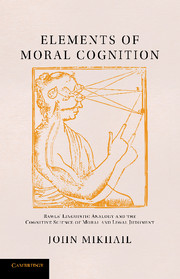 Elements of Moral Cognition
Elements of Moral Cognition Book contents
- Frontmatter
- Contents
- List of Tables and Figures
- Preface
- PART ONE THEORY
- PART TWO EMPIRICAL ADEQUACY
- PART THREE OBJECTIONS AND REPLIES
- 7 R. M. Hare, Peter Singer, and the Distinction between Empirical and Normative Adequacy
- 8 Thomas Nagel and the Competence–Performance Distinction
- 9 Ronald Dworkin and the Distinction between I-Morality and E-Morality
- PART FOUR CONCLUSION
- Appendix: Six Trolley Problem Experiments
- Bibliography
- Index
7 - R. M. Hare, Peter Singer, and the Distinction between Empirical and Normative Adequacy
Published online by Cambridge University Press: 07 September 2011
- Frontmatter
- Contents
- List of Tables and Figures
- Preface
- PART ONE THEORY
- PART TWO EMPIRICAL ADEQUACY
- PART THREE OBJECTIONS AND REPLIES
- 7 R. M. Hare, Peter Singer, and the Distinction between Empirical and Normative Adequacy
- 8 Thomas Nagel and the Competence–Performance Distinction
- 9 Ronald Dworkin and the Distinction between I-Morality and E-Morality
- PART FOUR CONCLUSION
- Appendix: Six Trolley Problem Experiments
- Bibliography
- Index
Summary
I fully subscribe to the judgment of those writers who maintain that of all the differences between man and the lower animals, the moral sense or conscience is by far the most important. This sense, as Mackintosh remarks, “has a rightful supremacy over every other principle of human action”; it is summed up in that short but imperious word ought, so full of high significance. It is the most noble of all the attributes of man, leading him without a moment's hesitation to risk his life for that of a fellow-creature; or, after due deliberation, impelled simply by the deep feeling of right or duty, to sacrifice it in some great cause. Immanuel Kant exclaims, “Duty! Wondrous thought, that workest neither by fond insinuation, flattery, nor by any threat, but merely by holding up thy naked law in the soul, and so extorting for thyself always reverence, if not always obedience; before whom all appetites are dumb, however secretly they rebel; whence thy original?”
– Charles Darwin, The Descent of ManIn Part One, I introduced Rawls' linguistic analogy and drew on the work of both Rawls and Chomsky to formulate a new analytic framework for the theory of moral cognition, modeled on aspects of Universal Grammar. In Part Two, I sought to clarify the empirical significance of the linguistic analogy by formulating, and stating a provisional solution to, the problem of descriptive adequacy with respect to a class of considered moral judgments, including the original trolley problems devised by Foot and Thomson.
- Type
- Chapter
- Information
- Elements of Moral CognitionRawls' Linguistic Analogy and the Cognitive Science of Moral and Legal Judgment, pp. 183 - 227Publisher: Cambridge University PressPrint publication year: 2011


